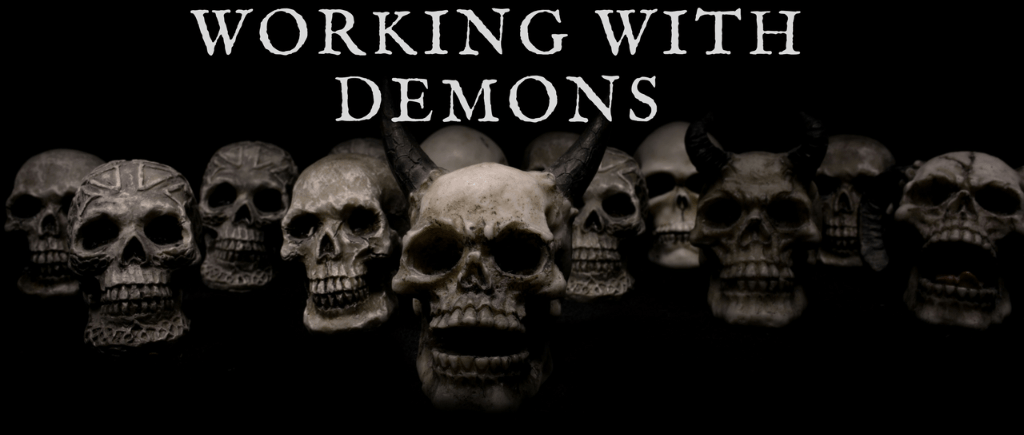Blog, Demons, Working With Demons
Mot: The Demon of Death
Mot was the ancient Canaanite god of death and the Underworld. He was worshiped by the Hebrews, Phoenicians and the people of Ugarit. His role in Canaanite mythology was stated in the texts discovered at Ugarit.
In Jewish Lore, Mot is a demon of death known to attach itself or stay around people who are about to die to help their souls in transiting to immortality. The name “Mot” is the Jewish word for death. As a demon associated with death, Mot personifies the loss of one’s soul from its body.
Mot is a representative of all that is contrary to Baal’s nature. While Baal represents life, fertility and rainfall, Mot is associated with death, sterility, heat and drought. Every year he attempts to kill Baal, only to see him raised from the dead with the help of Baal’s sister, Anat. The battle between Mot and Baal signifies the changing of seasons between wet and dry in the Canaan region.
According to Ugaritic texts, he lives in the underworld which is an unpleasant place of decay and destruction. Mot himself is the underworld, and his mouth is the gate. Once a living being passes through his mouth, there is no escape. He offers peace to all creatures in the form of death. .
The god Hadad (Baal) had sent a message to Mot to make him pay allegiance to him. Before his servants left he warned them saying:
“that you not come near to divine Death,
lest he make you like a lamb in his mouth,
(and) you both be carried away like a kid in the breach of his windpipe.”
When Mot received Baal’s message, he replied stating that his appetite is “as that of the Lions in the wilderness, like the longing of Dolphins in the sea”. The death god also threatened to eat Baal.
One day, he had the chance to do so and that made Baal’s sister Anat furious. She attacked Mot and split him with a blade. She went further to winnow this demon in a sieve, burnt him in fire, ground him under a millstone and threw the remnants over a field for birds to devour. Later on, El dreamt of Baal and sent Shapash to bring him back to life because the land was becoming very dry.
Seven years later, Death returns, seeking vengeance. He requested to feed on one of Baal’s brothers. However he was deceived as Baal gave him his own mother’s sons to eat. This resulted to a combat. El sent Shapash to inform Mot to stop the fight otherwise he will turn against him and overturn his throne. Mot accepted and the conflict ended.
According to this lore, Mot is said to have a large appetite for humans and gods. He crushes them in his monstrous jaws and mouth. He swallows the dead souls of the underworld carrying a scepter of bereavement or widowhood. Mot is greatly associated with the agricultural cycles of growth and harvest.
More about Mot
The Greeks identify the death god as the son of the Titan Kronos who is also the god of time in ancient Greek mythology. A Phoenician account of Mot can be found in a paraphrase of the Greek author Philo of Byblos by Eusebius, who writes of a Phoenician historian named Sanchuniathon. Here, Death or Mot is a son of El and is regarded as a god. The text which speaks of El states:
… and not long afterwards he consecrated after his death another of his sons, called Muth, whom he had by Rhea; this (Muth) the Phoenicians esteem the same as Thanatos (death) and Pluto”
In Hebrew scriptures, Death (Maweth /Mavet(h)) is sometimes personified as a devil or angel of death like in the books of Habakkuk 2:5 and Job 18:13. Also in both the Book of Hosea and the Book of Jeremiah, Maweth/Mot is mentioned as a deity to whom Yahweh can turn over Judah as punishment for worshiping other gods.
Mot as a demon
Mot is not a deity in the normal sense. He is never the object of worship and he has no role in Ugaritic personal name formation. He does not appear in the pantheon list of local gods. He is, rather regarded as a demonic figure, wholly evil and without redeeming features.
In at least one Ugaritic text, ritual KTU 1.127:29, Mot appears to be a simple demon that can attack the people of a city. This is probably also the implication of the ritual text KTU 1.119:26-36. It would be meaningless to ask Mot for help,or blessing and to name a child after Mot might be regarded as witchcraft. He is, therefore, not a part of the Ugaritic pantheon, despite his role in myth.
Citations:
1.https://www.themystica.com/mot/
2.https://en.m.wikipedia.org/wiki/Mot_(god)
3.The Encyclopedia of Demons and Demonology.

